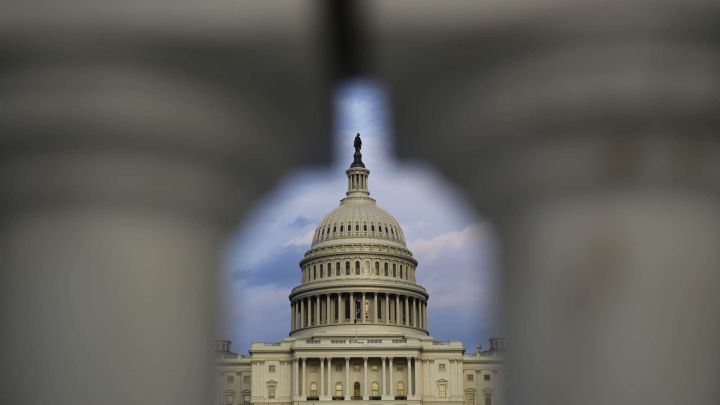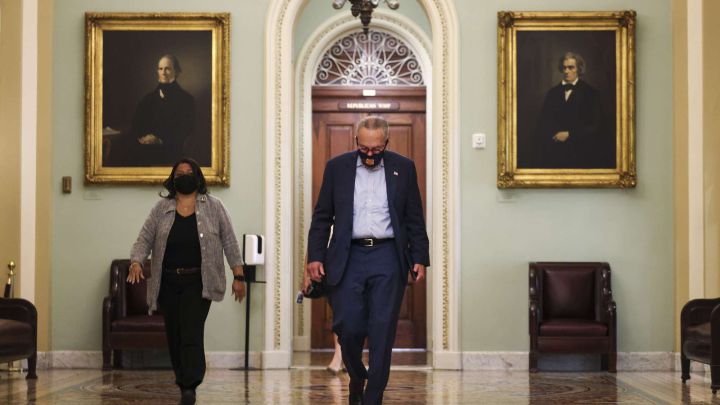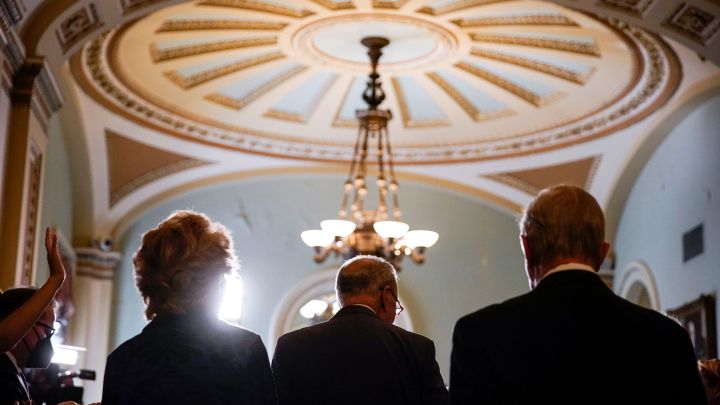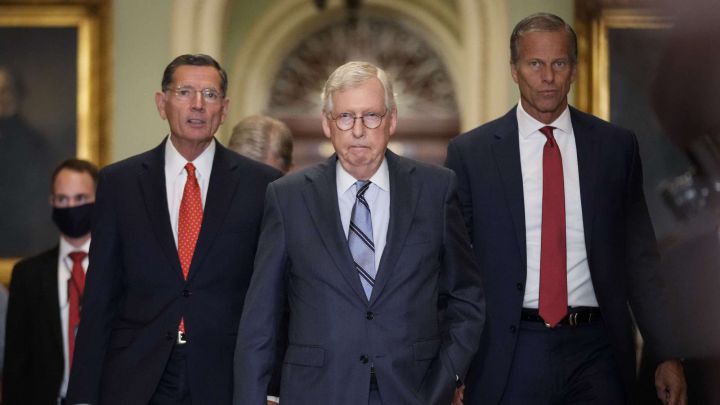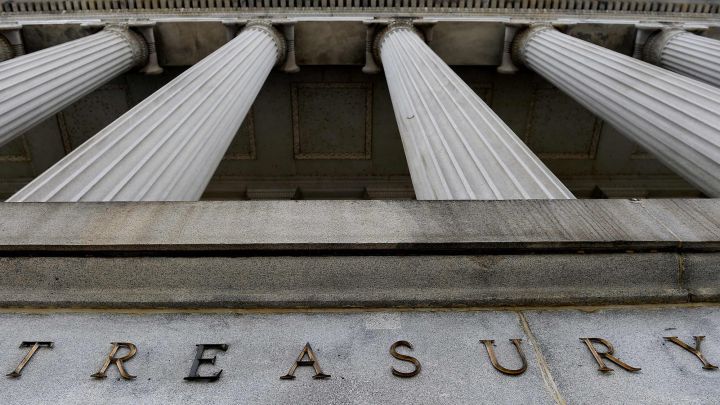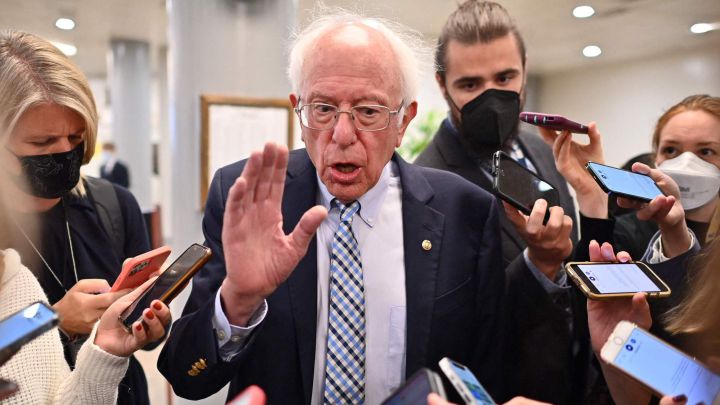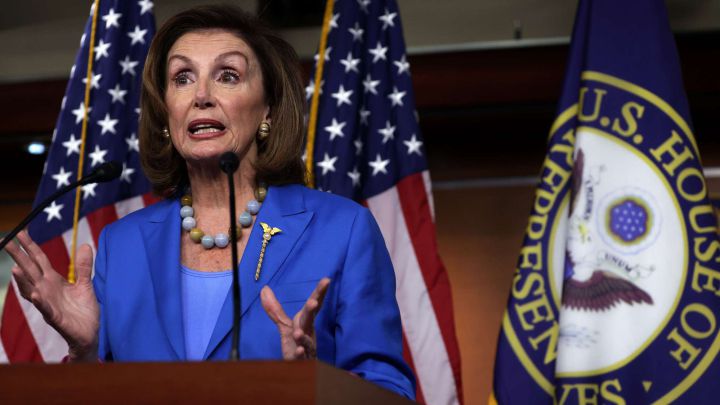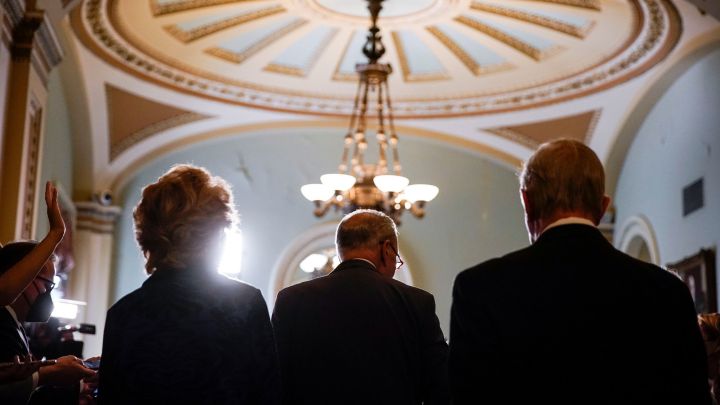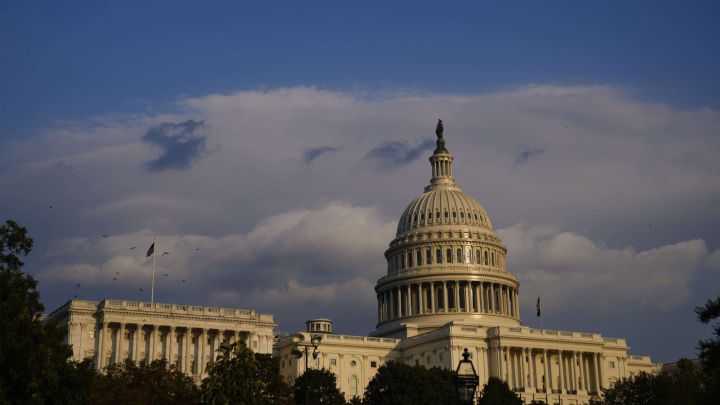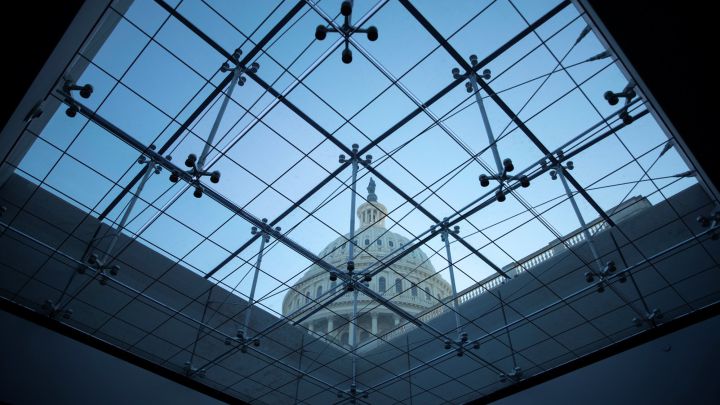Government shutdown live updates: Senate deal, infrastructure bill vote...
Follow all the latest news and reaction as it breaks with Congress needing to reach an agreement in order to avoid a lapse in the government's funding.
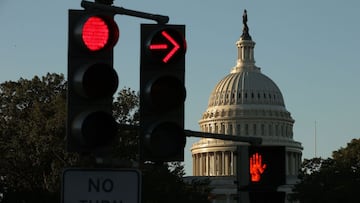
Show key events only
US government shutdown live | latest updates
Headlines
- President Biden signs stopgap bill,shutdown averted for now.
- Stopgap short-term spending measure heads to White House
- Congress moves to avert partial government shutdown
- Manchin says spending trillions more now is "fiscal insanity"
- House has voted to suspend debt limit until December 2022
- Democratic progressives threaten to vote down infrastructure bill unless spending package deal agreed
- Vote on infrastructure bill scheduled for 9 pm
Scroll through our related articles:
Wall Street had more than shutdown to contend
All three major US stock indexes are on track to show their worst quarterly performance since the before the onset of the covid-19 pandemic in 2020. The specter of covid-19 still lingers as the Delta variant has kept new case numbers high across the country. Additionally, fears of inflation have not been calmed. Throw into the mix the drama in Washington, the government will remain open but the infrastructure bill is stalled in the House and the debt ceiling crisis looms on the horizon.
President Biden signs bill averting government shutdown
The bill to keep the government running included funding for a slew of programs that are urgently needed.
Word on the infrastructure bill
Speaker Nancy Pelosi is coy about when the House will vote on the infrastructure bill.
When will the House vote on the bipartisan infrastructure bill?
After passing a spending bill to avert a government shutdown, the House is expected to gavel in around 9 PM to vote on the bipartisan infrastructure bill.
Shutdown officially averted
White House journalist for CBS Fin Gómez says that the government shutdown is officially avoided for now. Congress will need to pass a budget before 3 December to fund the government beyond that date.
The stopgap funding bill to avert government shutdown needs one more signature
The continuing resolution bill that will keep the US government funded for the next nine weeks has the necessary signatures from Congress. It will now be delivered to the White House for President Biden's signature.
The House's other business today, the infrastructure bill
Congress managed to get a stopgap funding bill passed on Thursday averting a partial government shutdown. The short-term funding measure will keep the government going until at least 3 December. But the day isn't done for lawmakers in the lower chamber.
The House is also supposed to vote on the bipartisan infrastructure bill passed by the Senate in August. The bill has been stalled in the House while Democrats drafted their reconciliation budget bill to include the parts of President Biden's agenda that was left out. The plan was to pass both spending packages at the same time.
Currently, Democratic leadership is negotiating off the floor on whether and when to move the infrastructure bill forward. Moderates want to unhitch the two bills but progressives have pushed back and there is a risk they will tank the infrastructure bill if two holdout Senators, Joe Manchin and Kyrsten Sinema, don't follow through on their supposed promise.
Senator Manchin says he made no such agreement.
Looming debt ceiling breach could slow Social Security checks
Out of the frying pan into the fire, or at least soon. In less than three weeks the US faces an even bigger problem than the near partial government shutdown that was averted on Thursday. On or around 18 October, if Congress doesn't raise the debt ceiling the US won't be able to meet its debt obligations which would lead to a default.
The consequences would be devastating and wide-ranging. One such would be a delay in sending monthly checks to 50 million seniors and disabled.
Americans shouldn't suffer political jockeying with government shutdowns
There have been 22 government shutdowns since 1976 under the current budget rules. some have lasted for just a few hours, others for days on end with the longest beginning at the end of 2018 and stretching for 35 days into 2019.
Is the federal government going to shut down?
Congress passed a spending bill Thursday afternoon, averting a government shutdown... for now.
The ink is on the paper...
House Speaker Nancy Pelosi has signed the continuing resolution to fund the government until 3 December. The short-term funding measure now heads to the White House for President Biden's signature before the midnight deadline.
Stopgap bill to avert government shutdown heads to Biden's desk
The continuing resolution to fund government operations has cleared the House by a 254-175 vote. The bill now heads to President Biden's desk for his signature to seal the deal and keep the lights on for nine more weeks.
However, Congress has a bigger problem coming down the pipe, raising the debt ceiling to avoid a default on the US debt.
Work in the House isn't done for the day. The lower chamber has gone into recess as Speaker Nancy Pelosi and Democratic leaders decide whether the bipartisan infrastructure bill will get a vote. Progressives have said they will tank the bill if the $3.5 trillion spending package to fund the rest of President Biden's agenda isn't passed at the same time.
Government shutdowns good for Wall Street?
Government shutdowns can be costly affairs as government workers are sent home without pay, which if the shutdown continues for a extended amount of time, can have a knock-on effect. However, Wall Street seems to view shutdowns differently, even making mild gains over half the time when one has lasted more than a day which has happened 20 times since 1976.
Fortunately, it appears that the US will avoid another one shut this Thursday, Congress looks set to kick the can down the road to 3 December pending a vote in the House this evening and President Biden signing the stopgap funding bill.
Stopgap funding bill heads to House for late night vote
Lawmakers have until midnight to avoid a government shutdown. The Senate voted this afternoon 65-35 to fund the US government until 3 December, by which time they will need to pass a budget or go through the same song and dance again.
The continuing resolution, or stopgap bill, will go over to the House where it will be put to a vote this evening. It is expected to pass but it needs to get to President Biden's desk before midnight.
Congress will punt government funding problem to avert shutdown
It is a hectic time in the halls of Congress, with Democrats haggling over the two bills they want to pass to make real President Biden's agenda, a debt ceiling crisis that if it goes unresolved will result in a first-ever default by the US and on the front burner funding the government to avoid a shutdown at midnight Thursday.
The Senate cleared the 60 vote hurdle to keep the lights on, at least for another nine weeks, until 3 December. Now the continuing resolution will head over to the House of Representatives where it is likely to pass and then go to President Biden's desk to be signed.
Cooling off period over the weekend?
The US is facing a new government shutdown if Congress can't agree to fund operations by midnight Thursday. Political Analyst Greta Van Susteren gives her take on what could happen today as Congress attempts to avoid another government shutdown.
"Oh I think we go through our incredible drama that we always have here in Washington. And I would guess if we have a shutdown, it will be from Thursday night to Tuesday. And both parties will say we need a cooling off period over the weekend."
What is a Government Shutdown? how many have been there in the US history?
The prospect of a government shutdown tomorrow is very real. The debt ceiling limit expires at midnight tonight and if an extension or suspension is not passed, then we could be looking at a shutdown similar to that of three years ago.
Shutdowns are nothing new in US politics, but since the 1990s they have become more frequent and more damaging. The Democrats need to get the ceiling lifted or their whole agenda could be at risk, not only affecting the Americans the agenda seeks to help but also damaging the Democrat chances of winning the midterm elections next year.
There have been ten shutdowns in US history, with the most recent being the winter of 2018/19.
House minority leader criticizes Democrats for leaving it so late
The main barb of his criticism is the fact the Democrats control all the levers of power, but have still left it to the last moment to try and suspend the debt ceiling.
Treasury Secretary Yellen warned that waiting until the last minute to address the debt ceiling would cause harm to business and consumer confidence. There is still no guarantee it can all be passed in time before midnight.
Is the US federal government really running out of money?
Hours after the Republican Senators blocked the increase of the debt ceiling, Treasury Secretary Janet Yellen warned lawmakers that the US government will run out of cash by October 18 if Congress fails to increase the debt limit.
"It is uncertain whether we could continue to meet all the nation's commitments after that date," Yellen's letter said. Moreover, she emphasized that the date is just an estimation based on tax payments and that date could vary as government's cash flows are "subject to unavoidable variability."
This debt default would be disastrous for the US economy, causing markets to stagnate and massive payment delays in all American public services.
Senate Republicans to support vote to prevent government shutdown
Mitch McConnell has signalled that Republican lawmakers are willing to vote with the Democrats to prevent a government shutdown.
McConnell repeated in floor remarks that Dems need to raise the debt limit on their own, arguing that "clumsy attempts at partisan jams by the majority will not change that reality. It didn't work on government funding, and it won't work on the debt limit."
What services are likely to stop during a government shutdown?
Despite frantic last minute talks to avert a government shutdown, it looks like there is still a possibility the politicians are going to fail to reach an agreement. So what could happen?
In spite of each federal agency, along with the Office of Management and Budget, having their own way of tackling a shutdown, all the plans have something in common: all essential services will continue.
Meanwhile, the individual services that would stop until the funding is renewed are subject to each federal government agency's criteria.
Social Security, Medicare and Medicaid are among the mandatory spending programs that would continue to operate despite the likely delays, according to the Social Security Administration.
Bernstein rejects 'progressive' description
"It's not so much what I think of these proposals but what the American people think of them," states Jared Bernstein on Squawk Box.
Investment in roads, buildings, bridges, safe drinking water for kids, child care, elder care, cutting prescription drug costs, cutting taxes...
"It's what the American people want to see."
Breaking Congress creatively
Grace Segers wrote this piece for The New Republic on how the US legislative bodies are demonstrating time and again their dysfunctionality.
Because there is little bipartisan overlap between the two parties, reconciliation has basically become the only option for the majority party to pass any of its priorities, because the minority will filibuster most every other issue. Democrats are using the reconciliation process to try to pass the Build Back Better Act, as it allows certain legislation to be approved with only a simple majority in the Senate, instead of the 60 votes needed to overcome a filibuster.
This is why negotiations over the bipartisan bill and the reconciliation bill are so agonizing—Democrats have exceedingly narrow majorities in both houses of Congress, meaning that leadership can’t afford to lose any votes on either bill. The reconciliation bill has to be amenable to moderates, and the bipartisan bill can’t pass unless they feel their desires for the former measure have been sufficiently satisfied.
Manchin maintains his stance
Moderate Democratic Senator Joe Manchin issued a statement late last night saying,
"Spending trillions more on new and expanded government programs, when we can’t even pay for the essential social programs like Social Security and Medicare, is the definition of fiscal insanity."
He also told reporters that negotiating the large "social infrastructure" bill could take weeks or more to complete, further complicating Democrats' hopes of passing the infrastructure bill that would pay for road and bridge building and other projects that the business community supports.
Can a Government Shutdown affect Child Tax Credit payments?
Late last week, the White House directed federal department and agency leaders to prepare for a possible shutdown. For many, this involved updating their lapse in allocations “contingency plans,” which outline which functions will continue to be carried out during a government shutdown.
The Treasury Department updated its plans in August, after the debt ceiling suspension passed in 2019, expired. And with the Republicans steadfast in their opposition to another suspension, questions are being asked about knock on effects.
How a government shutdown could impact on Child Tax Credit payments.
The debt limit battle
The other battle that is being fought in Congress is that of Democrats and Republicans continuing to scuffle over giving the Treasury Department additional borrowing authority, beyond the current statutory limit of $28.4 trillion.
A historic debt default could occur around 18 October, Treasury Secretary Janet Yellen has estimated, if Congress fails to act.
Republicans want no part of the debt limit increase, saying it is Democrats' problem since they control Congress and the White House. The House late last night approved a bill suspending the debt limit through December 2022.
Schumer on the Senate vote
This was Senate Majority Leader Chuck Schumer tweet a few hours ago.
On the floor he announced that the Senate had finally reached a deal to avert a government shutdown with a stopgap government funding measure to prevent a shutdown.
"We are ready to move forward," Schumer said. "We have an agreement on a CR, the continuing resolution to prevent a government shutdown, and we should be voting on that tomorrow morning."
Move to avert shutdown
The US Congress is making a move to avert one crisis while delaying another as the Senate is poised to approve legislation that would fund the federal government into early December.
The House is expected to approve the measure today following the Senate vote, preventing a partial government shutdown when the new fiscal year begins Friday.
Democrats were forced to remove a suspension of the federal government's borrowing limit from the bill at the insistence of Republicans. According to Treasury Secretary Janet Yellen, if the debt limit isn't raised by 18 October, the country would likely face a financial crisis and economic recession.
Republicans say Democrats have the votes to raise the debt ceiling on their own, and Republican leader Mitch McConnell is insisting that they do so.
As well as our live blog here focused on everything directly related to the potential shutdown, we are also able to bring you all the latest updates on the developments in stimulus checks, as well as those with child tax credits, and social security benefits.
Pelosi fires out message to Republicans
As the situation edges closer to the funding precipice, the House Speaker tweeted out the following message.
Pelosi says infrastructure vote will go ahead
Speaker of the House, Nancy Pelosi, has said that she is still planning to go ahead with today's vote on the infrastructure bill.
"That’s the plan,” Pelosi said defiantly, when asked although she was quick to add that it was a situation she was dealing with “one hour at a time.”
"Today, the House plans to move forward to honor its responsibility to protect the American economy and American families from the catastrophe of a default by passing legislation to suspend the debt limit," Pelosi said.
Who gets laid off during government shutdowns? Am I at risk of getting furloughed?
A shutdown is essentially the result of the federal government no longer being able to pay for the full extent of agencies and programmes that are usually in place. Without enough funding to cover the vast expenditure some agencies, and therefore some workers’ jobs, are temporarily cut.
However certain essential services will have their funding maintained throughout the potential shutdown to ensure that workers can continue to carry out their jobs. During a pandemic the continued of availability of services like healthcare are particularly important.
Will Gittins brings you what you need to know on who could be affected.
US government shutdown: welcome
Hello and welcome to our live coverage of the news that could potentially lead to a shutdown of the US government.
Today sees the final vote on President Joe Biden's infrastructure bill - the $1.2 trillion package already having passed through the Senate - and Congress needs to reach an agreement today if we are to avoid a pause to funding.
With strong voices pushing their agendas from all sides, it is difficult to predict exactly how this is going to play out but we'll be following every action and comment from the Hill and beyond throughout the day and night and bringing it directly to you.
